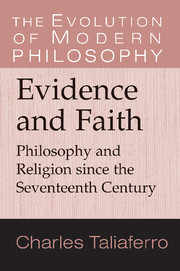Book contents
- Frontmatter
- Contents
- Acknowledgments
- Introduction
- 1 The Sovereignty of the Good in Seventeenth-Century Philosophy of Religion
- 2 Cartesian Philosophy of Religion
- 3 The Ascendancy of Rules of Evidence in Early Modern Philosophy of Religion
- 4 Humean Philosophy of Religion
- 5 Kantian Philosophy of Religion
- 6 Religion and the Philosophical Gods and Giants
- 7 Continental and Feminist Philosophy of Religion
- 8 Five Major Moves
- 9 Religions, Evidence, and Legitimacy
- Appendix A A Guide to Further Study
- Appendix B Select Contemporary Philosophers
- Select Bibliography
- Index
9 - Religions, Evidence, and Legitimacy
Published online by Cambridge University Press: 15 December 2009
- Frontmatter
- Contents
- Acknowledgments
- Introduction
- 1 The Sovereignty of the Good in Seventeenth-Century Philosophy of Religion
- 2 Cartesian Philosophy of Religion
- 3 The Ascendancy of Rules of Evidence in Early Modern Philosophy of Religion
- 4 Humean Philosophy of Religion
- 5 Kantian Philosophy of Religion
- 6 Religion and the Philosophical Gods and Giants
- 7 Continental and Feminist Philosophy of Religion
- 8 Five Major Moves
- 9 Religions, Evidence, and Legitimacy
- Appendix A A Guide to Further Study
- Appendix B Select Contemporary Philosophers
- Select Bibliography
- Index
Summary
A genuine mysteriousness attaches to the idea of goodness and the Good.
Iris MurdochWhose Encyclopedia?
The late twentieth century saw an abundance of encyclopedic, philosophical reference works, published by the leading Anglophone presses: Cambridge, Oxford, Blackwell, Routledge, Macmillan, and others. But for many years, since its publication in 1967, the standard reference work was the eight-volume Macmillan work, The Encyclopedia of Philosophy, edited by Paul Edwards. As I write, this work is still widely represented as a substantial reference work in philosophy in North American libraries. With more than 900 articles and an editorial board that reads like an honor role of the most prominent philosophers of the day, this reference work had an easy time commanding and representing the field for almost thirty years. Its editor, Paul Edwards (professor of Philosophy at New York University and then at City University of New York), explicitly identified his bias. “It would … be idle to pretend that this Encyclopedia is free from bias and that my own ideological commitments have not significantly influenced its content.” Edwards identified his slant as analytical philosophy in the Anglo-Saxon world. More precisely, it was an approach to philosophy that was not (in general) appreciative of the positive case that may be made for religious belief. Edwards's own entries are highly critical of religion.
- Type
- Chapter
- Information
- Evidence and FaithPhilosophy and Religion since the Seventeenth Century, pp. 392 - 430Publisher: Cambridge University PressPrint publication year: 2005

